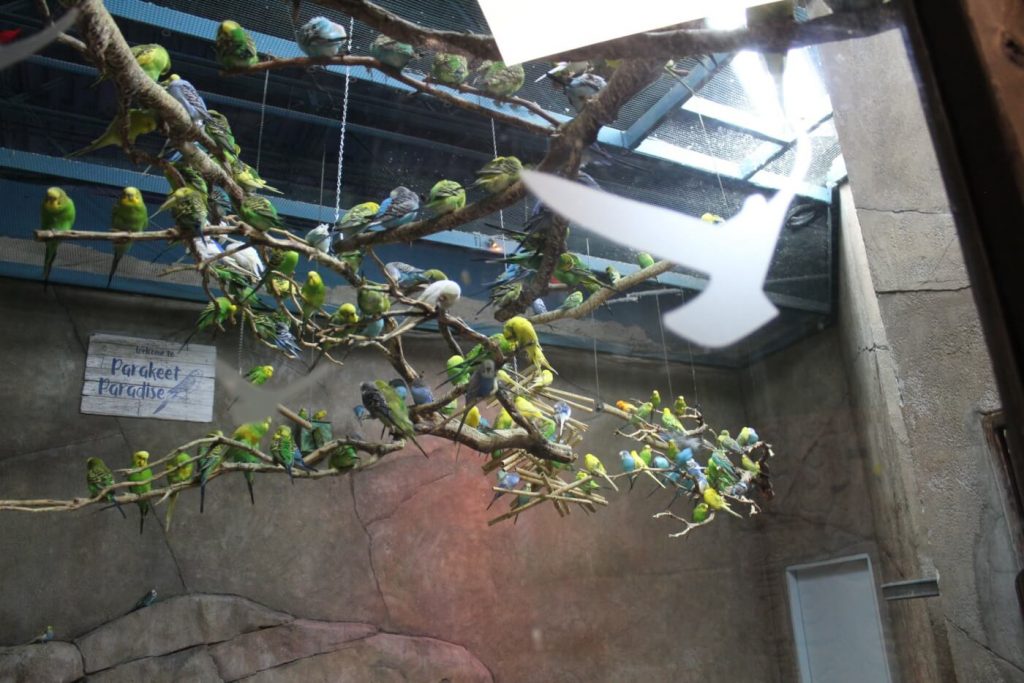Imagine you’re a common shell parakeet—also called a budgie—in constant danger of being crushed to death or badly injured by humans. Bred into existence for entertainment and confined to a crowded cage, you’re forced to endure a repetitive struggle for survival every day. Parakeet aviaries in roadside zoos and at fairs often subject birds to these horrific conditions.
Dangerous, Exploitative Parakeet Aviaries and Why to Avoid Them
Interactive budgie aviaries, where visitors can enter and feed the birds, often fall short in providing the animals with adequate space, perches, nest boxes, and enrichment to allow them to engage in normal, natural behavior. Severely crowded conditions make it challenging for staff to monitor the health, welfare, and safety of the birds, particularly during interactions with the public.
Recent Critical Citations
The U.S. Department of Agriculture has issued critical citations to roadside zoos such as York’s Wild Kingdom in Maine and Wilstem Wildlife Park in Indiana, where the agency noted incidents involving visitors stepping on parakeets. These incidents resulted in serious harm or death, emphasizing the need for improved safety measures in aviaries.
Concerns With SeaQuest
SeaQuest locations, including SeaQuest Littleton in Colorado and SeaQuest Las Vegas, have faced criticism for exploiting budgies.
In an incident at SeaQuest Littleton reported to Colorado officials, a child kicked, stomped on, and killed five birds, injuring other birds, too. State inspectors from the Colorado Department of Agriculture denied the facility a permit after it failed multiple prelicensing inspections. Officials had concerns about the bird exhibit, which they said was “potentially dangerous” for the animals. SeaQuest Littleton then transferred about 80 parakeets to a teenage employee—whose family advertised them online—and the birds were given away for free in a hardware store parking lot.
At SeaQuest Las Vegas, a whistleblower alleged that children had stomped on and killed birds there, too, and that workers had thrown the dead animals into the garbage.
Traveling Parakeet Aviaries
When a traveling exhibitor called Great Parakeet Adventure appeared at a festival in Kansas, a visitor reported problems with it to PETA: They witnessed people stepping on and holding birds, as well as a door being slammed on parakeets’ feet. The visitor claimed that multiple birds were injured, at least two were killed, and one flew away.
When interactive budgie exhibits take place at fairs and festivals, witnesses report finding parakeets loose near the event sites, likely having escaped from their enclosures.
Parakeets Are People, Too: Understanding Budgies
Every parakeet is a unique individual with distinct traits and behavior, including affectionate gestures, which underscores the importance of respecting their intrinsic needs. They don’t belong in exploitative aviaries being poked and prodded by humans—as if they were mere objects.
The term parakeet actually refers to 115 different bird species, all of whom are small seed-eating parrots with long, tapering tails and slender builds. The most common species of parakeet is the budgie.
They frequently exist in large flocks of up to several hundred members.
They’re highly active and need ample space to fly about. Otherwise, they may become frustrated, which can cause aggression toward other birds.
Budgies’ throat spots reflect ultraviolet light and can distinguish specific birds. This reflective sheen also plays a role in parakeets’ courtship and mating.
In nature, they’re nomadic. Food and water availability determines their movement.
Budgies show affection by feeding and preening each other.
Once a female has begun warming her unhatched babies, she only leaves her nest to relieve herself, stretch, and get quick meals, although by then, her mate almost exclusively feeds her.
Budgies sing and can mimic sounds around them.
In nature, parakeets can live up to 15 or 20 years.
They feed on seeds from a variety of plants, including spinifex grass, saltbush, and acacia. They’re known to forage for food in flocks and often feed on the ground.
Take a Stand for Parakeets
Avoid visiting roadside zoos and participating in encounters with animals, including birds. Advocate for the ethical treatment of budgies by urging the SeaQuest chain to stop using them and other species for entertainment. Help ensure a compassionate, respectful environment for these intelligent and social animals:
The post How Parakeets Are Crushed to Death at Roadside Zoos appeared first on PETA.

